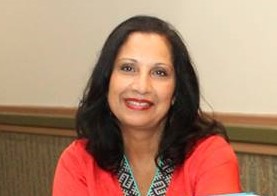Always challenging the norms
I called my youngest maternal aunt on her birthday. She is almost 90 now, and thankfully still independent. Her son and family were on vacation and she is okay staying alone for a few weeks. I told her that I am writing “Grandma Diaries” for my grandchildren- family stories of my family and their parents, and extended family.
When did you decide to become a doctor, I asked her.
She laughed and said that since childhood she always wanted to be a Doctor! Being the youngest of five, she was the tomboy among the three girls and never stayed home. She played on the streets with the boys when the family lived in Karachi in an area called Burns Road, a haven for refugees from all parts of India. Often they or she would get hurt hitting balls for cricket or other street games. She would create bandages from a torn scarf that all girls wear in Muslim countries especially at that time. She would even create a paste of slates that she would drag along the street and pound to cover the wounds with. Then she would sneak back into the apartment and hide her wounds with more scarves. I realized there is a tomboy streak running across our family, as I often escaped cooking lessons from my mother to play tennis or go biking.
When she graduated from Intermediate, which is the equivalent of high school here, she applied for medical college without asking her family. To her delight she was accepted into Dow Medical College, a renowned medical university in Karachi. When her father- my maternal grandfather- found out he was so proud and happy. He believed in equal education for girls and boys, which was unusual in that era and in that part of the world especially. He even brought his younger step brother to Karachi- a big city- from the village in Punjab as their father did not favor education for girls, and even for boys. He believed in being business people. My aunt graduated from Dow in 1958.
The rest of her career was stellar and pioneering. She taught post-graduate medical students and faced many challenges along the way, especially when she taught at a new medical college in the hinterland of Sindh, the southernmost province of Pakistan. Eventually she married and had her son. But her marriage did not last, and being a rebel, she got divorced, again challenging the norms of society and the pressure to stay in the marriage no matter how unhappy.
The few years I got to live in Karachi in between our stints abroad, I remember her driving her Volkswagen beetle with a Western style short scarf around her hair confidently navigating the crazy traffic of Karachi. I would never dare drive in that city, even though I can handle the agressive traffic of Manhattan.
For decades she commuted back and forth between Karachi and California, and kept a house in Karachi. We always worried about her traveling alone and living alone in that city, especially with the constant political turmoil that Pakistan seems destined to have. She thought nothing of it, and eventually did sell the house.
I always share how I had role models for women who had careers and balanced family. She was one of the most inspiring and the story of her tomboy nature was truly a great discovery, which I had never heard until now. I am glad I asked her that question, and will make sure to share that will our younger generation! She is our family role model for challenging norms and being courageous in the face of the consequences. I am so proud to know that my aunt is a role model of what Muslim women can be if they choose to that. I have many Pakistani American friends who are women doctors, including my younger sister, and they too charted their course to balance family and career in a demanding profession, each story unique and inspiring for all to know and share!

Be First to Comment